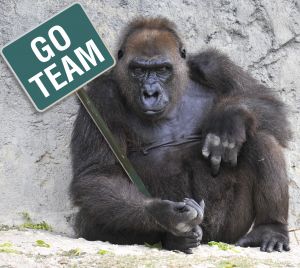Get Things Done and Stay Sane. The OKR way.
I’m not an organized person. But that doesn’t mean I can’t be an effective person.
Benjamin Franklin, creator of the modern day-planner or work diary (still called a “Franklin planner” in the US), as well as bifocals, the lightning rod, and the odometer (and a lot of other things), was an accomplished physicist, British postmaster to the Americas, an influential politician and revolutionary, a popular writer and successful publisher, a US Ambassador to France, the founder of America’s first Fire Department, and quite a lot else. He is often mistaken for having been a US President, owing to his enormous popularity. He was the 18th century’s own Elon Musk, in many ways, only more well-liked.
But Franklin was also famously disorganized, claiming that most organizational systems took more cognitive effort to master than simply remembering things. This was precisely what led him to the realization that the most efficient model was just to write things down. If it was important enough to write down, he reasoned, the effort of doing so would pay off. If it didn’t seem worth writing, you could safely forget whatever it was.
Since Franklin popularized the idea of a work diary, thousands of gimmicks and tricks have been packaged into products and marketed to make us more efficient and productive. But the truth is that the same basic principles, as true in 1750 as they are today, still apply. Franklin’s system, though it has a new name, is still the best.
Objectives and Key Results
OKRs is an adaptable goal-setting and efficiency promoting system based on Objectives and Key Results. In a given period (a year, a quarter, a week, a day, etc), a given objective is defined, and “key results” of that objective are listed. So for example, your OKRs for this week might include: “Computer Maintenance” as an objective. And under the objective, you would list concrete and measurable key results of computer maintenance. For example, “Hard drive backed up,” “desktop organized,” “malware scan completed,” and “keyboard cleaned.”
The value of OKRs is not just in self-motivation and goal-setting, but also in finding efficiencies. What key results are harder to achieve than others? Why? At the end of the period for your OKR, you can check how you did by ticking off, or scoring, your key results to see what percentage you have completed. Some companies use a 0-1 scale in which the goal is to have an average score of 0.6-0.7.
So for example, if you completed 3 out of 4 key results for an OKR, but missed one result, you would have a .75, or 75%. That tells you that your goal was pretty reasonable, and you got a lot of work done toward the goal. If you got only .25, meaning only 1 key result, then perhaps your goals are too lofty, or perhaps you are too inefficient. This can be a reflective exercise.
Tried and True
While the modern popularity of the OKR system stems from its use at Intel and later at Google, where employees can all view the quarterly and yearly OKRs of other employees, and teams, the Objective and Key Results system dates all the way back to Ben Franklin. He popularized the practice in a series of publications that were widely read in business.
OKRs require us to define a certain objective. In the sample from Ben Franklin’s own planner seen here, it was in the form of a guiding question: “what good shall I do this day?” At the end of the day, he would ask himself what good he had done. Doing something good was his objective, and he would write the key results underneath, then tally them later in the day to see how he had progressed. The system has not been changed much in 250+ years.
Why OKRs Will Keep You Sane
Let’s be honest. There’s not much that is less motivating than having to always define your level of success according to someone else’s rules. A boss or an organization have always had and will always need expectations. But a strict or exclusive focus on filling those expectations, to the exclusion of other concerns, makes for a lot of workplace stress. And it also leads to the fundamentals of good business practices being ignored. Things like worker safety, innovation and creativity, and relaxation- things that matter to people when it comes to their jobs- even if it doesn’t matter to their superiors.
How often have you ignored certain parts of your work that you find important, in order to devote more time to something else? How often have you “stolen a moment,” to get something done at work, because you know, even if your boss doesn’t, that it will be better in the long run if you get it done now? Or how often have your boss’s responsibilities become yours, simply because your boss has put pressure on you to improve his or her results? This kind of thing is avoidable using OKRs.
Improve Communication and Cooperation
Often times, we put a lot of pressure on ourselves to fix things that are outside of our areas of responsibility, and end up failing even in our basic duties as a result. Sometimes that pressure also comes from outside.
OKRs can help you to understand and to share responsibilities, and to work more responsibly, and more accountably, as part of the group. For example, my OKRs for this week include key results of two blog posts on two different topics, and a draft of two more for next week. Because we share OKRs as a team, I can see that Cedric, my boss, needs a certain number of views on the blog this week, and that supports his goal of getting applications to our accelerator (the due date for applications is nye).
I can see what his goal is, this week and every previous week, and I can see if he’s gotten close to matching the goal. In turn, I also know that when Cedric gives me feedback, he is concerned with his OKRs, and he also understands mine. He does not make me directly responsible for the number of page views we have- he doesn’t “blame” me, if we don’t get them. But he changes his approach to me in order to improve his own results, and in turn, we both benefit. If we get more views than his goal calls for, then he has the opportunity to congratulate me for my good work, and to use that experience to encourage me to continue. But if we don’t get as many views as he wants, he can take a look at what I’m doing, and ask me to make improvements in specific ways. This system helps him to avoid making unreasonable or irrelevant requests like “improve our traffic” (how?), and helps him to make reasonable ones: “do more of this kind of post,” or “talk less about this subject.” OKRs make him think about how to support me in my work, and help me to understand how my work is affecting his results, and the team’s success, in a real way.
The boss who does OKRs and sticks to the system will avoid putting too much unreasonable pressure on subordinates, and an employee using OKRs will have an accessible reference that tells them when and how they are underperforming, and when they are doing well.
Measure Results, not “Performance”
OKRs are not an evaluative tool, even if they look like one. First off, while team members look at their own OKRs and the OKRs of others, the focus is on the OKRs themselves, and not the work that goes into them. What this means is that members of a team, as well as superiors, can look at a person’s OKRs and get a feeling of how someone is performing, without involving their own personal judgements about how a person works. If the results are themselves measurable and concrete, and they are sufficiently relevant to the goal, then a person’s performance need never be in question directly. How a person does their job is left to them, where it should be. If a person has objectives that the team agrees with, and key results that match those objectives very well, then you shouldn’t care how they achieve those results, should you?
Does it matter that someone spends 15 minutes an hour outside smoking, or talks on the phone, or listens to music, or comes in at noon instead of at 9, if their objectives are good, and their results are consistent? If a person is getting all of their work done in 2 hours, perhaps their work isn’t satisfyingly challenging for them. Perhaps their goals are too modest, and they could set higher ones. Or perhaps not. Perhaps that person needs a lot of time to think, or likes to work quickly and steadily, and couldn’t handle more time in the office. Often we simply don’t understand what makes other people effective at what they do. But we don’t really have to understand, as long as we can see the results of their work.
Improve your Goals
Mostly when we talk about “measuring performance,” the idea of measuring someone’s output or their job performance goes hand-in-hand with increasing that output or pushing that job performance to higher levels. You made 50 units today, tomorrow you want to make more than 50. There is no end to that cycle.
While OKRs also aim to improve your job performance, they rely on internal motivations to do so. Instead of your performance according to some specific goalpost having to increase every quarter, week, or day, instead your performance is a free-floating point, and your goals change in order to give you something to work towards. My goal over the past two months has been two posts a week, and for a lot of reasons, I’ve struggled to meet it. So my goal next week can’t be three posts. But if it weren’t a struggle, then my new goal could be more ambitious.
In the OKR system, you are not succeeding if your score increases, and you are not failing if your score decreases. It’s not about winners and losers, leaders and laggers. It’s not about meeting goals, but about setting the right goals.
[ssba]







